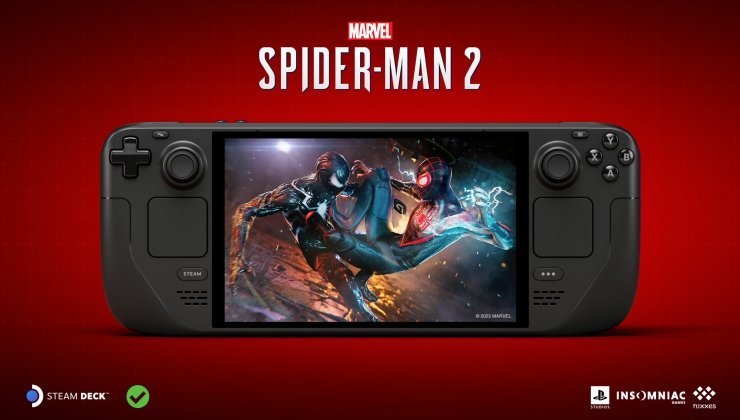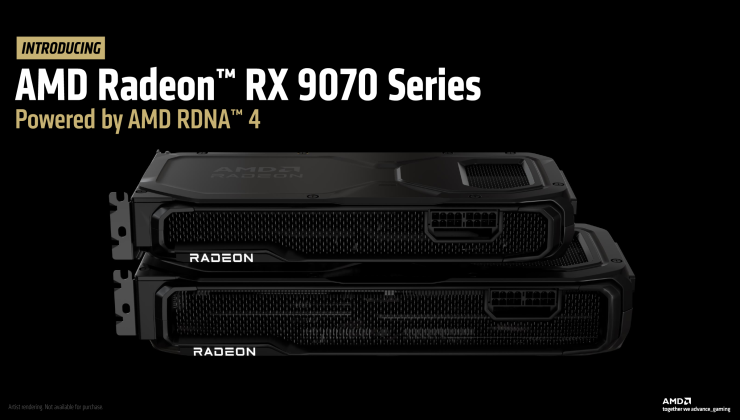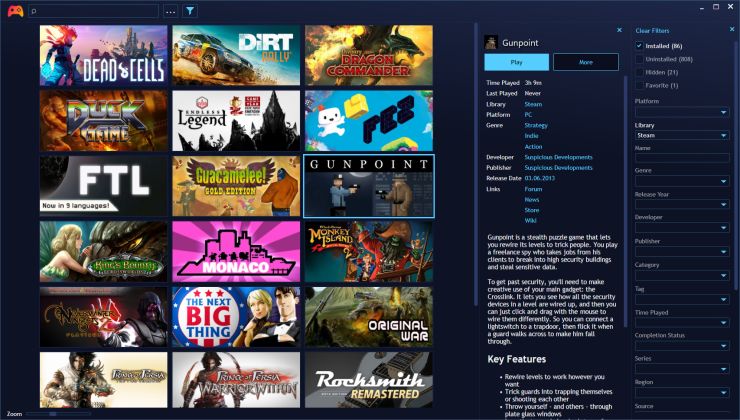Seems Valve really are expecting big things from the SteamOS 3 Linux-powered Steam Deck handheld, according to a new report from PC Gamer. Originally due to be launching this month, Valve ended up delaying it until February 2022. Due to all the worldwide shortages, many were worried about another delay but Valve appear confident in hitting that new date.
In the new report Valve sound very bullish, with designer Greg Coomer mentioning how different their shipping will be compared to traditional consoles. Valve don't need to ship masses of boxes around to traditional stores, as it's only sold in the one place - Steam.
Valve won't give out numbers but it seems they expect millions to have a Steam Deck by the end of 2023:
"We're going to have a launch that looks like a significant number of users right out of the gate, and then build that over time, rather than having the biggest splash on day one and then generally declining after that," he said. "If you extend the timeline out through 2022 and all the way to 2023, we expect to be building on our numbers constantly throughout that whole time, to the point where there's many millions of customers if things go the way we think they will, who are using Steam Deck by the end of that year or so, through 2023."
The good news is that their own production of Steam Deck units is not a bottleneck, just getting the parts is. Hopefully that will improve over the next year, as it's the same issue other hardware vendors also have.
According to Playtracker, they seem to think that somewhere around 700,000 people may have put down a deposit for a Steam Deck.
If they keep a fair price, promote the console and maintain the OS and the hardware properly it will be a huge success. It's not like there is much competition and there is absolutely no company that can provide what they can (being the owners of the biggest (by far) gaming store and all that).
But it's Valve, their attention span is almost as bad as Google's and they seem to believe that their products need no promotion, for some reason.
Let's keep in mind that Steam OS has been in a pretty poor state for a long time, Half Life Alyx came out almost 2 years ago and we haven't heard from them about VR games since then (although everything points to them being in the middle of the development of a new game but they are always in the middle of something that never gets released) and their controller was discontinued, probably because of the mixed reception it got. On the other hand I think people are happy with the Valve Index, it's difficult to say since they don't allow reviews of it.
So... I hope they succeed but it depends on them. We'll see.
On the other hand I think people are happy with the Valve Index, it's difficult to say since they don't allow reviews of it.
I wondered what you talk about. I guess it's Steam reviews, because of course there are reviews about it out there.
If Valve doesn't allow other companies from around the world to make official clones, this will be a megafail.
You mean, like PlayStation and Xbox?
Why?
People obviously want it. If I'd sell something and meet such an interest, I'd be happy.
If Valve doesn't allow other companies from around the world to make official clones, this will be a megafail.They will, they said back when it was originally announced they would expect others to follow and they've confirmed repeatedly SteamOS 3 will be released as a standalone. Any vendor will be free to make their own device but the Steam Deck is the only "official" Valve one.
If Valve doesn't allow other companies from around the world to make official clones, this will be a megafail.I don't see how that works. What do they get from official clones?
If Valve doesn't allow other companies from around the world to make official clones, this will be a megafail.I don't see how that works. What do they get from official clones?
Obviously, Valve would get people buying games on Steam.
I don't see though how not having that would make Steam Deck a fail.
I mean, they can't really stop unofficial clones even if they wanted to, it's an open platform. Anyone in an appropriate industry could make a tiny PC with a controller running some kind of Linux with Steam preinstalled. But nobody not expecting to profit from the game sales could match Valve's price point, I would think, so I'd expect anyone doing it wouldn't get nearly as big results. Just seems likely to be a kind of marginal phenomenon.If Valve doesn't allow other companies from around the world to make official clones, this will be a megafail.I don't see how that works. What do they get from official clones?
Obviously, Valve would get people buying games on Steam.
I don't see though how not having that would make Steam Deck a fail.
I mean, they can't really stop unofficial clones even if they wanted to, it's an open platform. Anyone in an appropriate industry could make a tiny PC with a controller running some kind of Linux with Steam preinstalled. But nobody not expecting to profit from the game sales could match Valve's price point, I would think, so I'd expect anyone doing it wouldn't get nearly as big results. Just seems likely to be a kind of marginal phenomenon.
I'm not sure about the "Steam preinstalled" part - which would be important - without Valve's agreement. But as they did agree...
I guess . . . at a minimum, there would be nothing to stop them putting a big button taking up half the first boot-up screen saying "Install Steam".I mean, they can't really stop unofficial clones even if they wanted to, it's an open platform. Anyone in an appropriate industry could make a tiny PC with a controller running some kind of Linux with Steam preinstalled. But nobody not expecting to profit from the game sales could match Valve's price point, I would think, so I'd expect anyone doing it wouldn't get nearly as big results. Just seems likely to be a kind of marginal phenomenon.
I'm not sure about the "Steam preinstalled" part - which would be important - without Valve's agreement. But as they did agree...
I'm rooting for it, but all I want is the os to play with
Why would you need the OS without the Deck itself? It's pretty much an Arch with Steam Client on it, you can get that right now.
their controller was discontinued, probably because of the mixed reception it got
I think its more likely due to the patent issue and that an update with newly available technology is inevitable. Capacitive touch thumbsticks? Grip inputs as buttons (avoiding the patent issue) rather than paddles? Faster poll rate for the touchpads and gyro? Idk, probably plenty of other things which could also be updated and improved but the Deck already demonstrates some of the updates that can be made.
Have you seen the amount of robotics Valve invested in to manufacture the controllers? [It was a lot.](https://www.youtube.com/watch?v=uCgnWqoP4MM) They didn't make that investment without a long term goal in mind. Those manufacturing robots can be reconfigured to assemble a new controller with different parts. Honestly, watch the video, it's cool.
Here's the caption: "When we first started designing hardware at Valve, we decided we wanted to try and do the manufacturing as well. To achieve our goal of a flexible controller, we felt it was important to have a similar amount of flexibility in our manufacturing process, and that meant looking into automated assembly lines. It turns out that most consumer hardware of this kind still has humans involved in stages throughout manufacturing, but we kind of went overboard, and built one of the largest fully automated assembly lines in the US. Our film crew recently put together a video of that assembly line, showcasing exactly why robots are awesome."
But nobody not expecting to profit from the game sales could match Valve's price point
Valve wants to expand the handheld PC running SteamOS market, they could subsidize other manufacturer's hardware to keep the cost down. How much more incentivized would a manufacturer be to release such a device if they got 15% of each game sold though SteamOS installed on their device? How little profit would they be willing to take on the hardware if this were the case? As we know Valve has gotten 30% of each game all along, they could really afford to do this and it would align their long term and short term goals:
• More users on Steam
• Less dependence on Microsoft's closed source platform
• More users on SteamOS
• A ubiquitous console-like PC gaming platform running SteamOS
• A [new product category](https://www.pcgamer.com/valve-intends-to-make-more-steam-decks/), the console-like handheld PC linux gaming device
• Other manufacturers releasing hardware in the handheld PC linux gaming market
• Overcoming the catch 22 / chicken and egg problem with the relationship between the linux market share and game devs targeting linux
• Incentivizing other industry movers to help with the catch 22 / chicken and egg problem (they've already made huge strides with proton to mitigate this intractable problem)
I think it would be a brilliant strategy on their part.
"We do feel like we're on track for that," Valve designer Greg Coomer said in an interview with PC Gamer on Thursday.I feel like I'm on track for steak & chips tonight, doesn't mean it'll happen.
Currently expecting Valve to announce another delay after Christmas.
... well I was on track for a kebab tonight, but now I want steak and chips.
Have you seen the amount of robotics Valve invested in to manufacture the controllers? [It was a lot.](https://www.youtube.com/watch?v=uCgnWqoP4MM) They didn't make that investment without a long term goal in mind. Those manufacturing robots can be reconfigured to assemble a new controller with different parts. Honestly, watch the video, it's cool.How have I never seen this video!? That's amazing!
If Valve doesn't allow other companies from around the world to make official clones, this will be a megafail.
Clones? No need. Companies can design their own shell and probably get the APU's themselves once the chip shortage ceases to be a thing... lol











 How to set, change and reset your SteamOS / Steam Deck desktop sudo password
How to set, change and reset your SteamOS / Steam Deck desktop sudo password How to set up Decky Loader on Steam Deck / SteamOS for easy plugins
How to set up Decky Loader on Steam Deck / SteamOS for easy plugins
See more from me